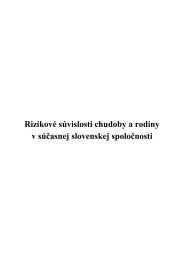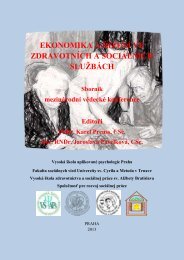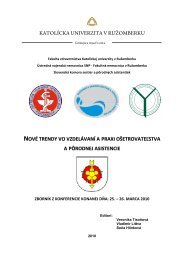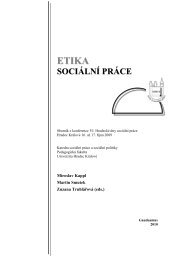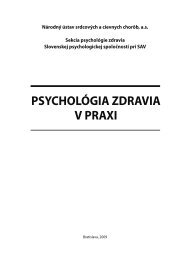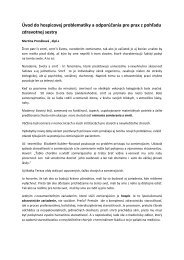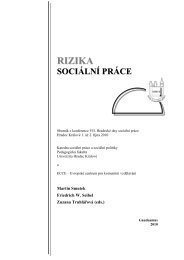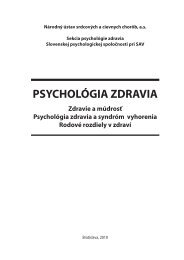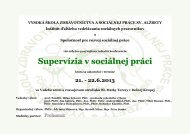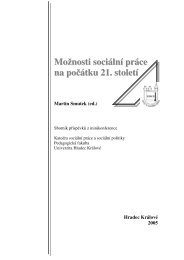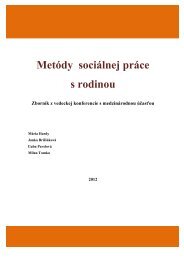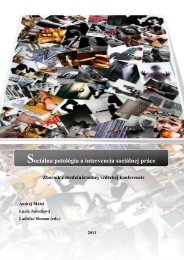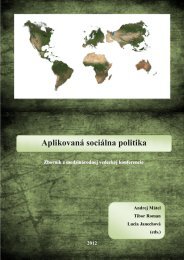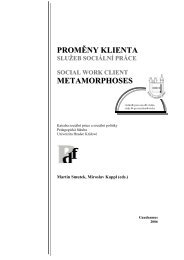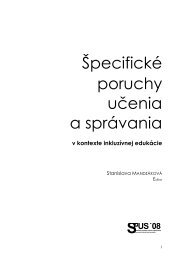Zmena klÃmy â možný dopad (nielen) na obyvateľstvo - Prohuman
Zmena klÃmy â možný dopad (nielen) na obyvateľstvo - Prohuman
Zmena klÃmy â možný dopad (nielen) na obyvateľstvo - Prohuman
Create successful ePaper yourself
Turn your PDF publications into a flip-book with our unique Google optimized e-Paper software.
comprehension. However, they did not explicitly explore issues of global justice.<br />
For example, several teachers made pancakes in the class, as Mama Panya does<br />
in the book, made props relating to the book or did art activities responding to<br />
images in the book. Two of the teachers applied the Building Bridges of Understanding<br />
methodology (Gleeson et al., 2010) for improving comprehension supporting<br />
literacy work.<br />
• Exploring Issues of Fairness<br />
Over half of the participants had explicitly explored the issue of fairness in an<br />
immediate or wider context. The learning experiences recorded reflected the centrality<br />
of the concept of fairness to early childhood education and showed educators’<br />
comfort in exploring the concept in both local and global contexts. However,<br />
the results also raised concerns that, in exploring fairness, educators might reaffirm<br />
a deficit model of development and impose domi<strong>na</strong>nt value systems.<br />
Many of the participating educators recorded that they had simulated fair and<br />
unfair sce<strong>na</strong>rios to help children identify fair/unfair outcomes. Examples recorded<br />
suggested a range of approaches on the part of the educators, from those who<br />
facilitated more open and critical diologue to more superficial and contrived considerations.<br />
One participant pre-school educator, for example, gave two children<br />
new toys and took one back before the child had had a chance to play with it. The<br />
children then discussed this experience. Another teacher divided up pancakes<br />
unevenly, facilitating discussion about sharing and fairness.<br />
Where participants explored the concept of fairness in relation to the storybook,<br />
there was evidence that this process priviliged an approach to development,<br />
in which the children’s ‘western’ and familiar circumstances were the desired outcome<br />
for all people globally. One participant educator described how, “ Children<br />
asked why the ladies carried stuff on their heads. Another child said because it is<br />
very heavy.<br />
I asked when we go to the market do we carry things on our head. They all said<br />
no we carry things in bags and put them in the boot of the car. I ask is it fair that<br />
they carry things on their head and we put our bags in cars. They all say no they<br />
should get cars. How can they get cars. What would they need. They all say money.<br />
How could they get money. Ask their daddy.” (Teacher, Junior Infant class)<br />
While the teacher is infusing a language of justice or “fairness” into the<br />
discussion around similarities and differences between the experiences presented<br />
in the storybooks and the children’s own experiences, this language is<br />
intently values-driven and serves to reinforce a conventio<strong>na</strong>l model of development<br />
which sees developing countries as lacking or backward and developed<br />
173



